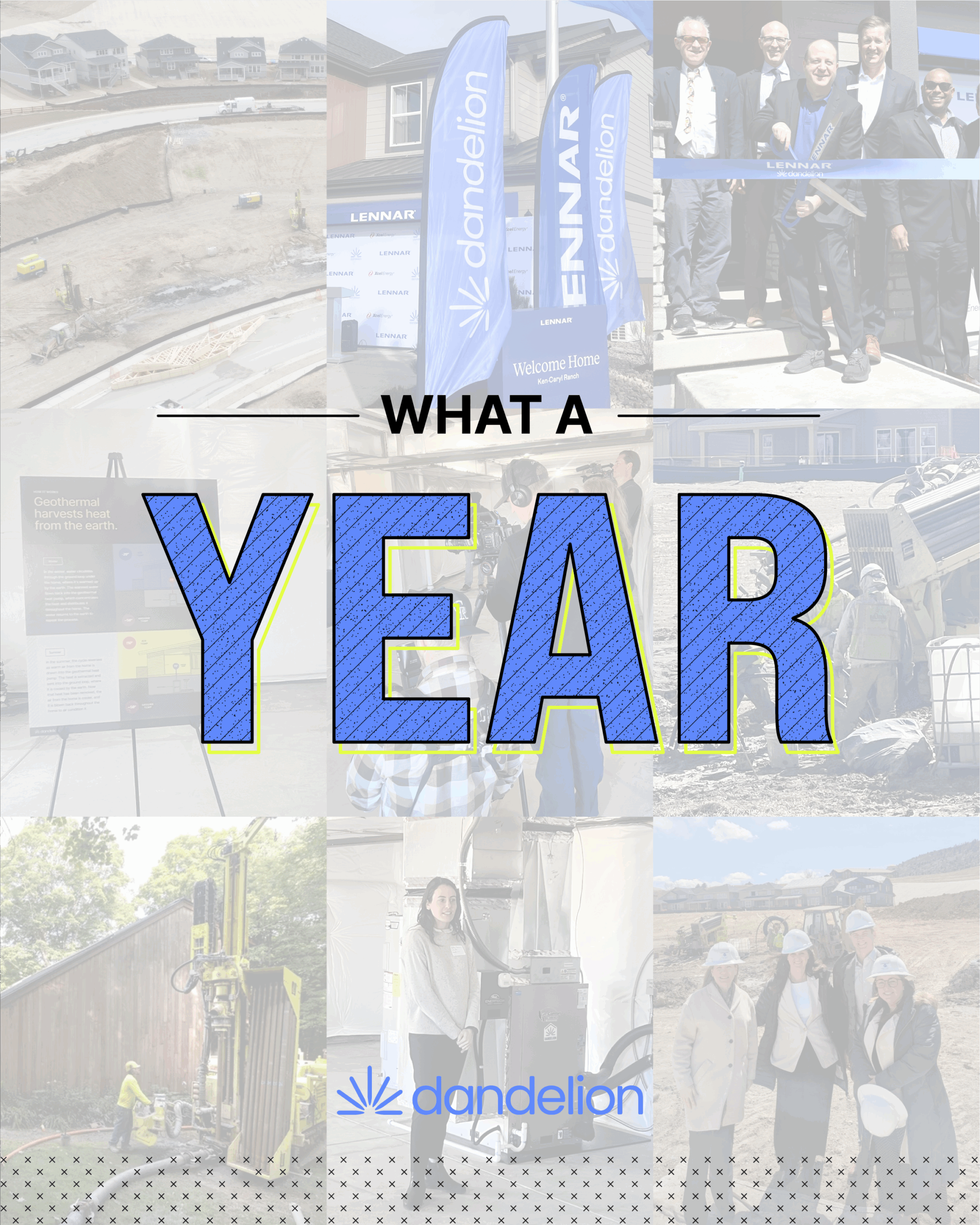One year ago, President Biden signed the Inflation Reduction Act into law, setting the United States on a path to decrease greenhouse gas emissions by 40% by 2030 and establishing numerous tax credits and incentive programs for homeowners looking to save money on their heating and cooling costs. These programs arrived just in time, as this summer has been the hottest ever on record, and natural gas prices are expected to rise once again heading into the winter.
Some of these incentives are available today, and others are just around the corner. So in honor of the first birthday of the Inflation Reduction Act, here are a few of the programs that Dandelion Energy is most excited about:
Tax Credit of 30% or more – Available Now
The first change to take effect was that the value of the tax credit for geothermal heat pumps increased to 30% of the cost of the entire system. The tax credit is available now and applies to geothermal heat pumps installed since the start of 2022, and extends through 2034. Any homeowner who will need to replace their heating system or air conditioning over the next 10+ years will be eligible for thousands of dollars in tax credits on geothermal heating and cooling. There is no limit on the value of the geothermal tax credit, and there are also complementary tax credits for air source heat pumps, heat pump water heaters, home energy audits, and air duct sealing – up to a total of $3,200 in additional credits.
Impact Analysis:
- Nationwide, these tax credits will save homeowners hundreds of millions of dollars in up-front costs each year, allowing households to affordably install geothermal systems and take advantage of the long-term bill savings.
- The extension of the tax credit for 10+ years will provide stability and growth to the industry over the next decade.
New Federal Rebates of up to $8,000 – Available Soon
The Inflation Reduction Act provides state energy offices with $8.8 billion to distribute to homeowners retrofitting or building new homes with energy performance improvements like geothermal heat pumps. All homeowners will be eligible for rebates of up to $4,000, and homeowners earning less than 150% of the Area Median Income could be eligible for up to $8,000. The Department of Energy recently released guidance on the program and state energy offices are able to apply for funding now, with programs expected to start reaching homeowners by late 2023 or early 2024.
Impact Analysis:
- 50% of the rebates are reserved for low and moderate income families, who stand to benefit the most from energy bill savings with geothermal. By reducing up-front costs, the rebates will unlock long-term savings for additional households across the country.
Incentives for Businesses and Building Owners Too
The IRA dramatically increased the incentives available to nonprofits, municipalities, businesses, housing developers, and multi-family building owners, making geothermal heat pumps more attractive than ever before for all types of buildings. There is now a 30% tax credit for geothermal heat pumps for businesses and publicly or non-profit owned buildings (up from 10% before the IRA). The tax credits can be even higher, 40-50% with bonus tax credits for domestic content and projects located in energy communities. This tax credit is available as ‘direct pay’ cash-back from the federal government to municipalities and non-profits. Commercial entities are also eligible for the 179D tax deduction and are often eligible for utility rebates and other state incentives, creating even better bill savings for all types of buildings.
Impact Analysis:
- The “direct pay” option for nonprofit organizations & public entities – allowing them to receive the tax credit even without owing taxes – will provide significant savings to groups that were previously excluded from tax credits while avoiding complex tax equity arrangements.
- With all of the different tax credits and bonus credits for businesses, we expect significant increases in commercial geothermal heat pump installations. We are excited to work with companies as they digest the latest IRS guidance and begin leveraging all of the bonus tax credits.
New Low-Cost Financing – Available Next Year
The largest funding stream in the Inflation Reduction Act was the Greenhouse Gas Reduction Fund, which provides $27 billion in capital for green banks and local financing organizations. This funding is expected to be distributed to green banks by mid-2024, so that they can expand low-cost financing options for homeowners and businesses.
Impact Analysis:
- The Greenhouse Gas Reduction Fund can help expand favorable loan terms for heat pump projects to more customers, such as the interest-free loan up to $50,000 offered by MassSave.
- Dandelion will continue to facilitate low-cost financing for our customers where available.
Guidance Needed on Third-Party Ownership
Most of the tax credits are already available, but the geothermal industry is still waiting for IRS guidance on third-party ownership. These ownership models are similar to rooftop solar leases and power purchase agreements. They can lower upfront costs and make geothermal systems more accessible to low-income homeowners, landlords, and others who might not qualify for tax credits. Industry estimates show that expanding third-party ownership could prevent more than 64 million metric tons of greenhouse gas emissions. It could also create over 90,000 good-paying jobs, including roles for drillers, electricians, plumbers, and HVAC installers.
Impact Analysis:
- Without IRS guidance, the Biden Administration will miss a critical opportunity to bring low-cost geothermal heating and cooling to millions of low- and moderate-income families.
Get Started Today with Dandelion Energy
The Inflation Reduction Act offers a wide range of tax credits and incentives. Thanks to these programs, geothermal heating and cooling has never been more affordable. Homeowners, businesses, nonprofits, and multi-family building owners can all benefit.
That’s why now is the right time to consider Dandelion geothermal. Click below to find out if your home pre-qualifies for a Dandelion Energy home geothermal system.


